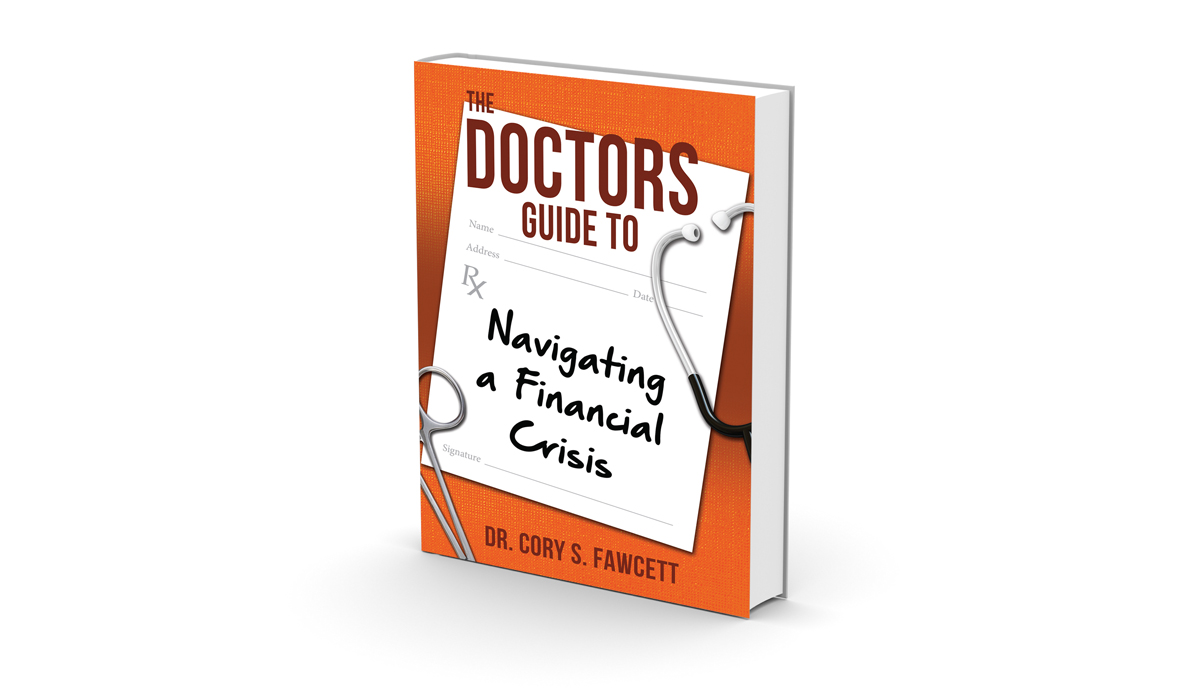My new book, The Doctors Guide to Navigating a Financial Crisis, is almost here! Pre-order now and be one of the first to receive this needed book. If you have been hit financially by this pandemic, this is the book for you.
“This is the definitive guide for any professional facing a financial emergency. Take a deep breath, buy this book, and read it cover to cover–I guarantee your outlook will be much improved, and you will have a solid framework to tackle what lies ahead”
–Joseph Russell, M.D.
The book is now available for pre-orders through Amazon and will be released on June 16th.
Many people are in a personal financial crisis at any given time. Right now, with unemployment at a lifetime high, the number of households in financial crisis have skyrocketed. The lost jobs during the pandemic shutdown have overshadowed all the other usual causes of financial crises; health problems, death of the family bread winner, and natural disasters to name a few.
When a crisis hits you personally, it is front page news to you. Everything else in your life tends to take a back seat. I wrote this book so you could have a road map to use when you need to navigate back out of a crisis. Following are five concepts you can use to navigate through your crisis. These were adapted from the many concepts discussed in chapter 13.
1: Stay Calm
Calm always wins in a crisis. The antithesis of calm is panic, which usually gets us into trouble. When we saw the toilet paper shelves empty during the start of the pandemic, it was a sign of people entering panic mode. Hoarding things like toilet paper will not get us through a crisis. It also hurts those around us. Some people actually ran out of toilet paper that week and went to the store to find empty shelves. Our actions can hurt other people when we panic.
When the stock market drops, rushing to sell is another show of panic. Selling causes the market to drop even further. Since you know the stock market will drop periodically, you should plan for it to happen. If you panic when it happens, then you were not investing appropriately for your comfort level. Being ready for what could happen is a good way to avoid panic.
2: Own the Situation
This is not to say you are always responsible for what happened to cause your financial crisis, but to emphasize that you need to step up to the plate and own the response you are about to make.
In every crisis there are things you have control of and things that are out of your control. Own the things you can control. You are responsible. A better way to word that is “Response Able.” You are able to respond to the situation. So, are you responding? Or are you sitting back and sulking? Here is a chance to take the reins and make your next move. Don’t be concerned about the things you cannot control or the things that have already happened. Take charge and begin your march toward resolving your crisis.
What is the next right thing you need to do? Figure that out and start moving. Do you need to make cuts in your spending? Do you need to apply for unemployment? Do you need to contact your landlord to discuss the situation? Do you need to begin a job search today? Own your situation and start taking action immediately.
3: Take Care of Your Obligations
Before this crisis hit, your life was running along and you likely had some plans in motion. Don’t ignore those plans. If there are things you agreed to do before the crisis, see to them during the crisis as well. You may need to cancel those obligations, but that is not the same as ignoring them.
This is not the time to hide your head in the sand and ignore your obligations. Life doesn’t stop because you are having a meltdown. Life goes on and when this is over, you’ll still be going on as will. If you ignore obligations you made before the crisis, you will burn bridges you might need once the crisis has ended.
If there are things you are no longer able to do that you had on your schedule, contact those people and let them know what happened so they can make other arrangements. They know these things happen. My father-in-law recently passed away and his funeral service conflicted with a speaking engagement I was booked for. I contacted the organization and let them know this family emergency was going to prevent me from coming to speak. They were understanding about it. Had I just not shown up, they would have felt differently, even when they later found out why I didn’t make it.
4: Have Fun
No matter how bad the situation, you still need to take time each day to have fun and laugh. Laughter is great medicine for your soul. Spending all your time worrying about your problems does nothing to help you or solve the problems. But spending a little time away from your problems having fun with your family will help you all.
Fun doesn’t have to cost money. You can walk in the park, take the kids to the playground, play hide and seek, go to the free concert in the park, have friends over to play cards, or go on a family hike. (I realize some of these activities are not available if your area is shut down right now, but you get the picture. Do something fun.)
You need something to do to relieve stress, make memories and generate some peace of mind. Don’t become Eeyore just because things are not going well right now. Spend part of your day in Tigger mode and have some fun.
5: Be Yourself
Often when things get tough, we start grasping at straws and doing things we normally do not do. Now is not the time to start buying lottery tickets, laying on the coach all day in front of the TV, day trading stocks, or robbing a bank.
Do not suspend your moral compass in desperate times like Walter White did in the TV series Breaking Bad. Right and wrong have not changed and neither have you. Your situation might have changed, but you haven’t. Don’t become something you are not simply because you are going through hard times.
If you do find yourself with a lot of free time, do something useful with that time. Learn a new job skill, volunteer somewhere, learn to play a musical instrument, learn a new song if you already play, or spend more one-on-one time with your kids. Take advantage of this opportunity to better areas in your life that require time you normally don’t have. Come out of your crisis a better person.
Every financial crisis has a different root cause and creates a different hardship and a different timeframe in each person’s life. But if you keep these five things in mind, as well as the others I cover in the book, you will come out of your crisis in a better position than you would if you let the crisis take over your thinking.
If you are in financial difficulty right now, Pre-order a copy of The Doctors Guide to Navigating a Financial Crisis before June 16th by clicking right here so you can be one of the first people to get the book. Then you will be on your way to recovery. If you are doing fine but have a friend dealing with a financial crisis, order the book and give it to them.





